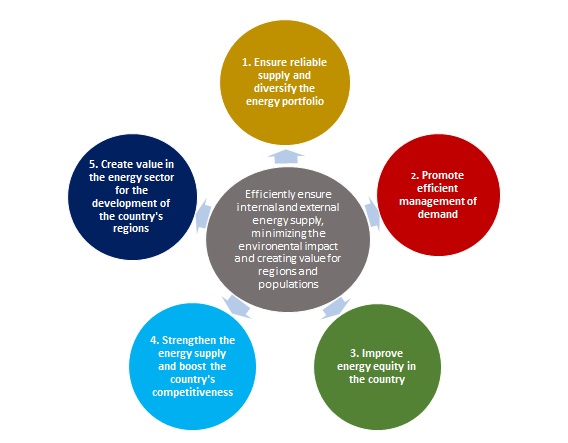
Colombia is South America’s fourth-largest country in land area and, with 47 million people, Latin America’s third-largest population. The country’s electricity sector is dominated by hydroelectric and thermal generation; however, Colombia has great potential to develop new renewable energy technologies, primarily wind, solar, and biomass.
Colombia has developed a long-term plan designed to address the country’s energy needs, priorities, and goals through 2050. In this article, the Mining and Energy Planning Unit (UPME for its acronym in Spanish) lays out the plan’s key objectives.
Taking into account that the main goal of an energy policy should be to efficiently ensure internal and external supply, in a way that causes minimum environmental impact and creates value for the country’s regions and populations, Colombia’s new national policy defines five specific objectives. These focus on securing supply, meeting demand, providing universal services, strengthening interconnections with other countries, and creating value in the energy sector. The plan also lays out two cross-cutting objectives to ensure that the country has the know-how and institutional structure it needs to achieve its energy goals. These objectives are illustrated in Figure 1.
Figure 1: Specific and Cross-cutting Energy Policy Objectives



The first specific objective has to do with energy supply, in particular the need to achieve a reliable supply and diversify the energy portfolio. Broadly speaking, this objective is designed to incorporate other energy sources and their associated technologies into the production both of electricity and of fuels used mainly in the transport sector, industry, and the residential sector, so as to secure a reliable energy supply. It also seeks to ensure that the associated transport infrastructure is available and is integrated seamlessly into ecosystems and societies and that it takes into account technical change.
The second objective seeks to promote efficient demand management across all socioeconomic sectors. The aim is to reduce energy intensity and encourage low-carbon development through increased efficiency of consumption. This involves incorporating better energy-use habits and adopting new and better technologies and efficient price signals. Measures to improve energy efficiency will simultaneously improve reliability of supply and mitigate the environmental impact caused by the development, generation, and transport of energy.
The third objective aims to improve energy equity, moving toward the goal of universal and affordable access to related services, as there are still areas in the country that lack access to energy or do not have a steady supply. Besides guaranteeing access to services, the plan contemplates approaches that have a low environmental impact and at the same time are affordable for consumers.
The fourth objective focuses on stimulating investment in interconnections between countries and in infrastructure for buying and selling strategic energy sources. Interconnections with neighboring countries and the international market serve a dual purpose: first, they strengthen the internal energy supply and second, they make the country more competitive.
Finally, the fifth objective is intended to make it viable to create value in the energy sector for the development of regions and populations, so as to maximize the energy sector’s contribution to exports, macroeconomic stability, competitiveness, and national development. Colombia is firmly convinced that value chains related to energy development are a means to overcome problems related to poverty and social fragmentation in some parts of the country.
The two cross-cutting objectives focus on having the support needed for the development of the energy sector. The first aims to ensure that the energy sector has the information, know-how, and innovation it needs to make decisions and the human capital necessary to carry them out. The second cross-cutting objective is to make the state more efficient, modernize and update the sector’s regulatory frameworks, and address environmental and social challenges to ensure that the necessary technical and transactional changes can be adopted and developed effectively.
The Mining and Energy Planning Unit’s proposed guidelines for achieving these energy policy goals have been published its Plan Energético Nacional – Ideario Energético 2050.
 View Map
View Map